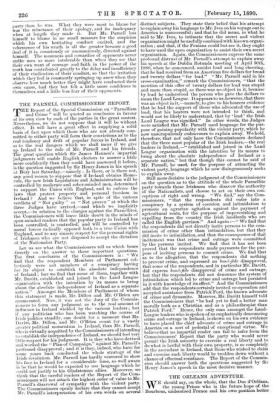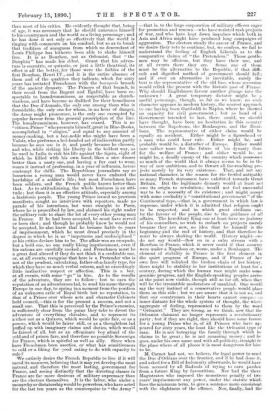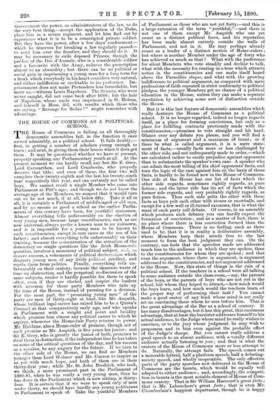THE ORLEANS ADVENTURE.
WE should say, on-the whole, that the Due d'Orleans, the young Prince who is the future hope of the Bourbons, understood France and his own position better than most of his critics. He evidently thought that, being of age, it was necessary that he should announce himself to his countrymen and the world as a living personage ; and he has done it not only so effectively that the world is ringing with comments on his conduct, but so as to break that tradition of smugness from which no descendant of Louis Philippe has hitherto been able to shake himself free. It is as Bourbon, not as Orleanist, that "the Dauphin" has made his debut. Grant that his adven- ture is eccentric, or quixotic, or just a little theatrical, its effect is all the better, for those were the foibles of the first Bourbon, Henri IV., and it is the entire absence of them and of the qualities they indicate, which for sixty years has irritated Frenchmen with the bourgeois branch of the ancient dynasty. The Princes of that branch, in their recoil from the Regent and Egalite, have been re- spectable to humdrumminess, as respectable as church- wardens, and have become so disliked for their homeliness that the Duc d'Aumale, the only one among them who is formidable, the only one for whom, in an hour of danger, the Army might pronounce, is the only one exempted by popular favour from the general proscription of the line. The humdrumminess, however, has ceased. This is no "citizen-Prince " who presents himself, great in Blue-Books, accomplished in " ologies," and equal to any amount of money-making, but a .boy-noble who might have been a Valois, who performs a hot-headed act of indiscretion partly because be sees use in it, and partly because he chooses, and who, while risking his liberty in the boldest way, as he used in India to risk his life against the tigers, eight of which he killed with his own hand, likes a nice dinner better than a nasty one, and having a fur coat to wear, wears it instead of professing, in a year of influenza, heroic contempt for chills. The Republican journalists say so luxurious a young man would never have endured the hardships of a soldier's life ; but most Frenchmen have been soldiers, and the French public knows better than that. As to attitudinising, the whole business is an atti- tude; but then it is an effective attitude, especially among a histrionic people. The young Prince issued no previous manifesto, sought no interviews with reporters, made no parade of his intentions, but went straight to Paris, where he is proscribed by law, and claimed his right under the military code to share the lot of every other young man in France. If he had been accepted, he must have served or been shot ; and though he probably knew he would not be accepted, he also knew that he became liable to years of imprisonment, which he must dread precisely in the degree in which he is as "impetuous and undisciplined" as his critics declare him to be. The affair was an escapade, but a bold one, no one really liking imprisonment, even if his rations are carefully cooked ; and Frenchmen must be a great deal altered if they do not think it a creditable one, or, at all events, recognise that here is a Pretender who is not of the prudent, calculating, father-of-a-family type, for which they have so much verbal esteem, and so exceedingly little instinctive respect or affection. This is a boy, at all events, with some " go " in him. As to the results of the adventure, they are to follow ; but to earn the reputation of an adventurous lad, to send his name through Europe in one day, to spring in a moment from the position of an unknown exile of Royal birth but no reputation, to that of a Prince over whose acts and character Cabinets hold council,—this is for the present a success, and not a small one. That this is perceived by the Prince's enemies, is sufficiently clear from the pains they take to divest the adventure of everything chivalric, and to represent its author not as a Quixote, which would be quite fair, or as a poseur, which would be fairer still, or as a thoughtless lad puffed up with imaginary claims and duties, which would be fairest of all, but as an effeminate boy afraid of the cold and of prison fare, and therefore no possible Sovereign for France, which is spiteful as well as silly. Since when have Frenchmen been ascetics, or what has sensitiveness to cold or a liking for good eating to do with capacity to rule ?
We entirely desire the French Republic to live if it will mend its manners, believing that it may yet develop the most natural, and therefore the most lasting, government for France, and seeing distinctly that the directing classes in France are far more desirous of military supremacy than are the electors themselves. It is the latter, who under a monarchy or dictatorship would be powerless, who have acted for the last ten years as the counterpoise to "the Army" —that is, to the huge corporation of military officers eager for promotion and renown—who have resisted rash projects of war, and who have kept down impulses which both in Asia and Africa might have produced long campaigns of aggression. The electors steady the career of France, and we desire their veto to continue, but, we confess, we fail to understand the feeling of English Liberals as to the comparative claims of "the Pretenders." Those gentle- men may be officious, but they have their use, and at all events there they are. Some one of them must be the alternative to the Republic, if that diffi- cult and dignified method of government should fail ; and if ever an alternative is inevitable, surely the best is the representative of the old line, whose accession would relink the present with the historic past of France. Why should Englishmen favour another plunge into the unknown ? A great temporary dictator might be a useful personage, though, so far as we know, no such character appears in modern history, the nearest approach to one having been Garibaldi in Naples, where he showed no capacity for civil government ; but as head of a Government intended to last, there could, we should have thought, have been no hesitation in this country between the Napoleons, the Boulangers, and the Bour- bons. The representative of either claim would be equally an accident. Either might be a 'figurehead or a man who could bear rule. Either might be, and probably would be, a disturber of Europe. Either would care rather more for the future of his dynasty than for the welfare of France ; and either would be, or might be, a deadly enemy of the country which possesses so much of the world that it always seems to be in the way of new ambitions, and to thwart all far-reaching pro- jects merely by its very existence. That, and not any national character, is the reason for the fretful antipathy so many French statesmen have exhibited towards Great Britain. But the legitimate dynasty would at least not owe its origin to revolution ; would not feel successful war to be a necessity of its existence ; and might accept with some cordiality a "constitutional government " of the Continental type,—that is, a government in which law. is supreme, under which it is admitted that religion ought to be respected, and in which great civilians can, by the favour of the people, rise to the guidance of all affairs. The hereditary King can at least have no jealousy of his counsellors, no wish to embark on projects merely because they are new, no idea that he himself is the beginning and the end of history, and that therefore he must be always shaking the world. History might—we do not say would—flow on in a calm stream with a Bourbon in France, which it never could if that country were under a Napoleon or, worse, under a Boulanger. The element of stability in France is the first element in the quiet progress of Europe, and if France of --her own free will relinked the broken chain of her history, there might be stability in her institutions at least for a century, during which the human race might make some genuine progress, and the English-speaking peoples arrive at the point now visible, though still so far off, when they will be the irresistible moderators of mankind. One would say the very instinct of a conservative people would place them on this side ; but we are aware that it is not so, and that our countrymen in their hearts cannot conquee an inner distaste for the whole system of thought, the whole aggregate of feeling, represented to them by the word "Orleanist." They are wrong, as we think, now that the Orleanist claimant no longer represents a revolutionary party ; but if they are right, they should have some favour for a young Prince who is, of all Princes who have ap- peared for sixty years, the least like the Orleanist type of man. He is not betraying the family through which he claims to be great ; he is not amassing money ; and he goes, under his own name and with all publicity, straight to the place where of all places it is most dangerous for him to be.
M. Carnot had not, we believe, the legal power to send the Due d'Orhians over the frontier, and if he had done it, and asked for a Bill of Indemnity afterwards, he would have been accused by all Radicals of trying to earn pardon from a future King by favouritism. Nor had the three Magistrates who imposed the monstrous penalty of two years' imprisonment any power, under the statute which fixes the minimum term, to give a sentence more consistent with the slightness of the offence. Nor, finally, had the Government the power, as administrators of the law, to do the very best thing,—accept the application of the Duke, place him in a severe regiment, and let him find out by experience what it is to be a conscripted private soldier. But they have the power, after a few days' confinement— which be deserves for breaking a law regularly passed— to send him over the frontier, and they should do it. It may be necessary to exile deposed Princes, though the pardon of the Due d'Aumale, who is a considerable soldier and a favourite with the Army, reduces the proscription almost to an absurdity ; but there can be no political or social gain in imprisoning a young man for a long term for a freak which everybody in his heart considers very natural, and either indifferent or creditable to its performer. Im- prisonment does not make Pretenders less formidable, but more so,—witness Louis Napoleon. The Stuarts, who were never caught, did not come back after 1688; but the heir of Napoleon, whose uncle was imprisoned in St. Helena, and himself in Ham, did, with results which those who are crying, "Revenge for Sedan !" might remember with advantage.




































 Previous page
Previous page